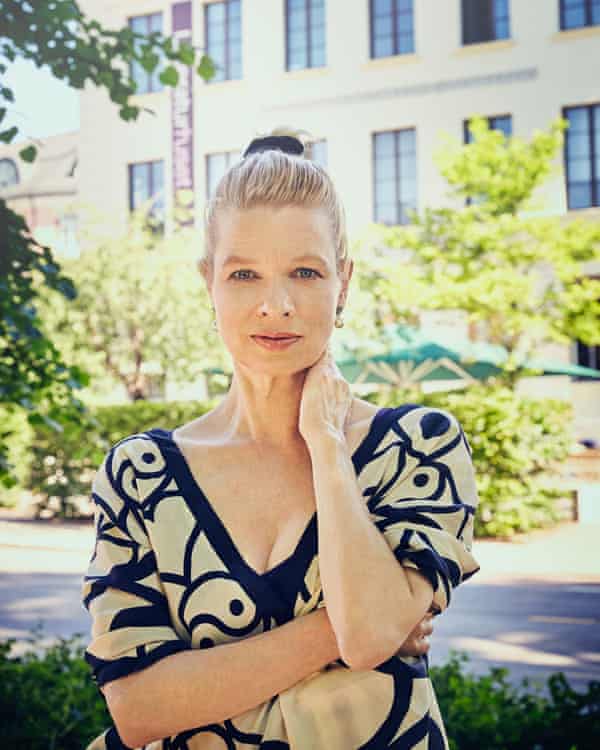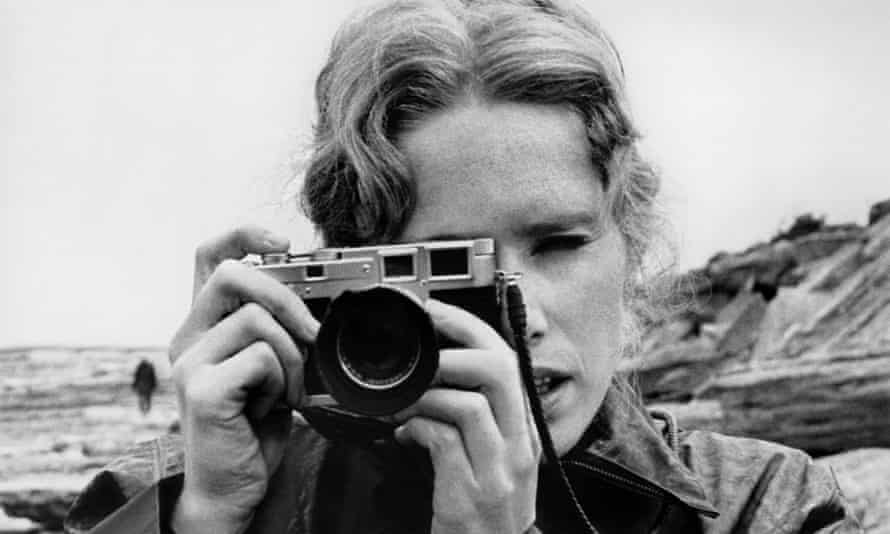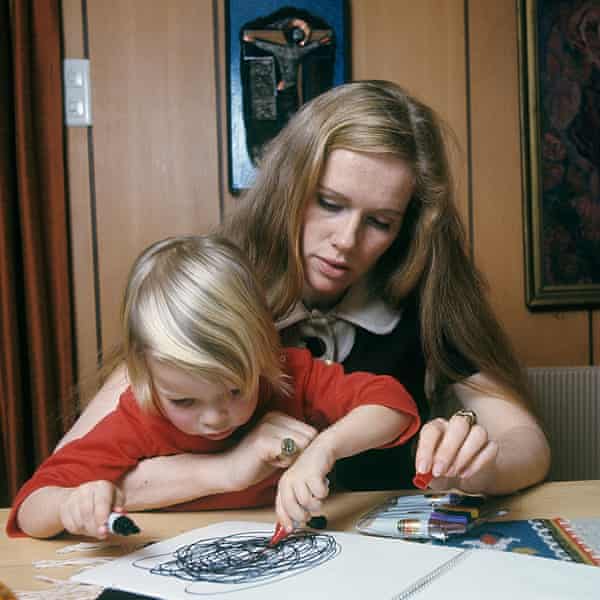 |
| Linn Ullmann |
Linn Ullmann on her father, Ingmar Bergman: 'It was as if all the windows of his mind had opened'
The Norwegian author’s powerful new novel, Unquiet, grew out of a series of conversations she recorded with the film director not long before his death
BIOGRAPHY OF LINN ULLMANN
When Linn Ullmann’s father was well into his 80s, he began to refer to the life that he was now experiencing as “the epilogue”. Lying in bed in the mornings, he would tot up his ailments, allowing himself one per decade: if there were fewer than eight, he would get up; if there were more, he would stay put. But these strategies denoted realism rather than appeasement, and his determination to continue work remained largely unshaken.
 |
| Collaboration ... Ingmar Bergman with his daughter Linn Ullmann during the filming of Autumn Sonata (1978). Photograph: Arne Carlsson |
Ullmann’s father was the great Swedish film director Ingmar Bergman, and the work that he fixed on in his last years was a collaboration with his daughter, a book that would capture something of his life and thoughts as he approached the end. Recalling the beginnings of the project as she talks to me from Oslo, Ullmann emphasises the centrality of the creative process to Bergman’s life. “When it’s work, you know, then we know what we do. We’re working: good. We had so much fun discussing when we were going to write the book, how, what form it would take.” His preferred title, he joked, was “Laid & Slayed in Eldorado Valley”, a phrase that he’d always hoped to use for the name of a film.
Instead, what emerged, over a decade after his death in 2007, was Ullmann’s sixth novel, Unquiet, a powerful and unsettling hybrid of memoir, fiction and meditation, braided together in a fragmentary structure that reflects, among other things, Bergman’s love of Bach’s Cello Suites.
It is, she tells me, a work built on “the ruins of a book that I didn’t write”. As father and daughter delightedly planned their project in numerous letters, phone calls and meetings, Bergman “kept getting older”. By the time work began in earnest, in the spring and summer before his death, physical frailty had been joined by something else: “Things had changed very much; just in a few months, his language had changed, the memory loss was now very obvious to him and to me. It was as if all the windows of his mind had opened up so that things that were real and things that were imaginary or dreamlike – he didn’t always have the capacity to see the difference.”

The six conversations between them, recorded at Hammars, Bergman’s home on the Swedish island of Fårö, form a vital strand of Unquiet but for many years Ullmann didn’t even listen to them, believing them to be part of the “huge fiasco” that the unfinished project had become: “It was physically painful, almost, to listen to those tapes. So I just put away the tape recorder … I mean, I should have started earlier, I should have insisted that we do it earlier, I should have asked different questions when we sat there, I should have had a better tape recorder because the tape recorder was lousy. I shouldn’t have been so high pitched.” It was her husband, the writer Niels Fredrik Dahl, who prodded her into retrieving the recorder from the attic: “Don’t you want to just listen to it now that you’re writing this book? And then I listened to it. And I transcribed it. And I translated it from Swedish to Norwegian. And it was just delightful.”
These initial feelings, of course, are an acute form of the regrets that so often accompany death; the conviction that had we acted differently, we might somehow have mitigated our bereavement, or preserved something more tangible of our loved one. But in Ullmann’s case, there is a sense of something particularly heightened – almost primal – about the experience.
She was born in 1966, the same year that Bergman’s celebrated film Persona was released. Her mother, the Norwegian actor Liv Ullmann, was the joint star of the film, in which she plays a woman – also an actor – who has suddenly stopped speaking and who is taken to a cottage by a nurse, played by Bibi Andersson. Bergman wrote the script – rapidly, while recovering from pneumonia – with the two women in mind; and it was filmed on Fårö, which he subsequently made not merely a home but also a sort of kingdom, endlessly adding buildings that included a cinema and a writing lodge.
Bergman and Ullmann, who went on to collaborate on 10 films, began a relationship. He was 47, four times married and father to eight children; she was 20 years his junior, and also married (indeed, her doctor husband was present at Linn’s birth). After the director and Ullmann, who is often referred to as one of his muses, separated, he married again. Linn, his ninth and final child, spent her summers at Hammars; the rest of the time she lived with her mother in Oslo and the US, with her grandmother and a succession of nannies stepping in when Liv was away working. “I was his child and her child,” she writes in Unquiet, “but not /their/ child, it was never us three; when I browse through the pictures lying spread out on my desk, there isn’t a single photograph of the three of us together. She and he and I. That constellation doesn’t exist.”

The book’s final form gradually became clear; first-person narration is interspersed with a more novelistic prose, in which “the girl”, “the father” and “the mother” orbit one another. Their names – either real or invented – are never given. At one point when I refer to a “you” in the narrative, Ullmann gently corrects it to “the girl”. But she has no intention of suggesting that her and her family’s life does not form the basis for Unquiet; rather, she says, she wanted to occupy a space between genres. “I obsess about that word between,” she tells me, and cites writers such as Rachel Cusk, Deborah Levy, John Berger, Edwidge Danticat and Emily Dickinson as helpful influences, as well as the choreographers Pina Bausch and Merce Cunningham and the composer John Cage.
If Bergman is the book’s consistent focus, Liv Ullmann, who is now 81, inhabits its wilder margins. Where the solitude and introspection of Hammars represents Bergman’s world, Ullmann cannons between Oslo, Los Angeles and New York, often accompanied by her daughter, whose experiences include having her hair ruffled by Margot Fonteyn in a Manhattan hotel corridor and being sent a tin of caviar by her mother’s Russian suitor. Her parents’ different trajectories also reflect their different roles in the culture: “One very traditional male artist, another female actress, one the looker, the other one being looked at.”
As a child, Linn remembers her desperate love for her mother, which included immense distress if, for example, her mother rang just a few minutes late: “I was madly in love with my mother. Not only for her incredible beauty, and I write about that beauty: how vivid and strong and crazy beauty is and what it does to us, and desire. But when you’re a kid and you’re hit by such incredible love, you don’t have the words for it. You don’t really have the words for it when you’re adult either butit’s desperate, it’s longing, and it’s that realisation that if this person disappears, I’m gonna die. I can’t live.”

When I say that it must have been hard to have a mother who did seem to be disappearing, quite often, she is quick to point out that Ullmann was a working woman in the 1970s, as well as an unmarried mother, and that she lived in an often judgmental public glare. Linn herself hated the paparazzi photographs that she featured in, and felt humiliated by evidence of her own childhood, such as having to wear a plastic folder around her neck when she made solo plane journeys to join her mother: “I did not want to be a child. I did not know how to be a child. I was almost a little bit ashamed of being a child.” I ask her what her mother made of the book. “She knows what it’s all about,” she replies, with a touch of wryness. “I mean, she’s an artist.”
Towards the end of Unquiet, the 16-year-old girl strikes out alone for Paris. What she encounters there will underpin the second of what Ullmann envisages as a loose trilogy. “The portrait of the girl stops at that,” she explains. “It doesn’t go further, and doesn’t explore mother or girl further. And you meet her again when she’s, you know, ancient. Fortysomething. Now I’m even more ancient [she is 54]. So then I will write from the place of this ancientness.”
When Unquiet was first published in Norway, a journalist rang her and asked if she could spare “five minutes” to go through what was fiction and what was fact in the book. She laughs. Five minutes wouldn’t really begin to do it justice. In fact, it appears, it might be the work of a lifetime.


No comments:
Post a Comment